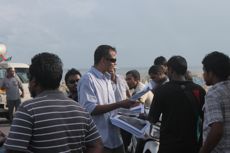Mobile phone bills of Anti-Corruption Commission (ACC) members were paid out of the commission’s budget illegally, according to the independent institution’s audit report for 2010 made public yesterday.
The audit report published on the website of the Auditor General’s Office found that the bills of mobile phones given for office use were paid by the commission from April 2010 onwards if the amount did not exceed Rf 650 per month.
“Since according to article 16(a) of the Anti-Corruption Act salaries and allowances for commission members shall be determined by the People’s Majlis (parliament), we note that following the parliament’s Public Accounts Committee’s (PAC) response on March 30, 2011 to the Anti-Corruption Commission’s letter on March 16, 2011, [the commission] stopped paying the phone bills of members,” reads the audit report.
“The [PAC] letter told the commission to cease paying phone bills until the Public Accounts Committee reviews phone allowances of institutions whose salaries are determined by the People’s Majlis and informs [the commission of a decision].”
In addition, the audit report noted that unused funds left over after ACC trips were not properly recorded under the applicable budget code.
Moreover, reports of such trips were not filed within three working days of the end of the trip as stipulated by clause 5.13 of the state financial regulations.
An ACC spokesperson had not responded to Minivan News at time of press. However ACC Deputy Chair Muaviz Rasheed told newspaper Haveeru today that the mobile phones were used for office work and the ACC received authorisation to pay the phone bills from the Finance Ministry.
While a monthly limit of Rf 650 was set, Muaviz said that the amounts paid were below the limit for most months.
The audit report meanwhile noted that the ACC’s financial statement was prepared in accordance with international public sector accounting standards and “shows the commission’s financial status truthfully and accurately.”
Out of the Rf16.5 million (US$1 million) annual budget released to the ACC in 2010, the report noted that Rf12.4 million (US$800,000) was spent on salaries and allowances for employees. Over Rf778,000 (US$50,400) was meanwhile spent on training staff.
The ACC audit report for 2010 is the first report released by the Audit Office since 2009 following former Auditor General Ibrahim Naeem’s contentious dismissal by parliament in March 2010 over corruption allegations. After rejecting the President’s first nominee, Naeem’s replacement – current Auditor General Ibrahim Niyaz – was eventually approved in May this year.
